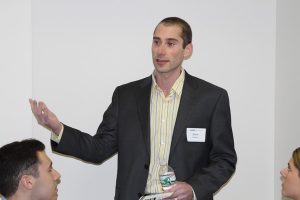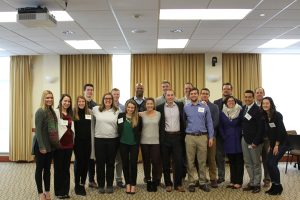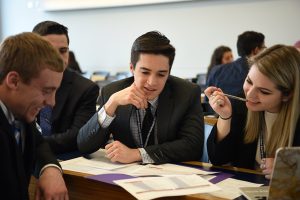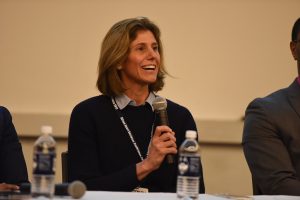 Pat McKenna, the UConn Associate Director of Athletic Communications and current Sport Management graduate student, works primarily with the women’s basketball team. He shares his experiences working with the organization, specifically while at the NCAA Final Four, and discusses the strenuous responsibilities that these student athletes have during that time, in addition to winning games.
Pat McKenna, the UConn Associate Director of Athletic Communications and current Sport Management graduate student, works primarily with the women’s basketball team. He shares his experiences working with the organization, specifically while at the NCAA Final Four, and discusses the strenuous responsibilities that these student athletes have during that time, in addition to winning games.
I have had the privilege of serving as the primary media relations contact for the UConn women’s basketball team for the past six years. Each of those years has ended in a trip to the NCAA Final Four and the last four seasons have successfully concluded with the Huskies hoisting the NCAA national championship trophy.
Though traveling with the Huskies to the Final Four has been both exciting and rewarding, it has also become apparent that the NCAA and ESPN seem to have little regard for dedicating free time to student athletes. The rigorous schedule that the players, especially the five starters, are forced to endure during the days leading up to the national semifinal makes it difficult for them to make their performances in the game the priority.
The Division I NCAA Women’s Basketball Championship Final Four was held in Indianapolis in 2016, a great host city due to the fully-equipped Bankers Life Fieldhouse that offers several hotels in close proximity, allowing teams a short commute to and from the arena. But before the four competing teams are able to participate in any kind of competition, they are required to run through a gauntlet of media responsibilities, beginning two days before the national semifinal.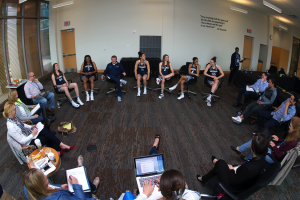
In my three previous Final Four experiences, this session took place at the arena. However, in 2016, it was instead held at the palatial NCAA headquarters. I must admit that the setup of the NCAA headquarters was ideal, due to the fact that the building offers several large rooms in close proximity, making it easy to travel from one requirement to the next.
On the Friday before the national semifinal, I drove the five starters and Geno Auriemma to the NCAA headquarters in an NCAA courtesy van, armed only with our itinerary that included constant media responsibilities from 10:15 a.m. to 1:00 p.m. All six Huskies knew what was ahead of them when we met that morning, which is why none of them seemed very happy to see me.
The first item on the agenda was a “tease shoot” for ESPN and NCAA.com. During this 50 minute session, each player and coach is asked to perform a variety of tasks, including but not limited to staring at the camera in an intimidating fashion, yelling excitedly and answering questions asked by ESPN and NCAA.com producers. These clips are then displayed during the game broadcast on ESPN and online on ESPN.com, ESPNw.com and NCAA.com.
Some of the NCAA representatives and I were able to corral everyone and bring them down the hall to the Summitt and Wooden rooms, where all six Huskies met with the ESPN production team for a half hour to hold off-camera interviews. The talent team, consisting of Beth Mowins, Doris Burke and Holly Rowe, was in attendance for this session, along with game producer Phil Dean and several other ESPN employees who play an integral role in the game broadcast.
This half hour is valuable for the production crew because it provides an opportunity for them to gather background information from the players and from Coach Auriemma that they can then use during the broadcast. It also offers a chance for the organization’s members to get to know the players a little better and to further comprehend the mindset of the team. All of the players, and especially Coach Auriemma, feel comfortable talking candidly with this group as its members are both trustworthy and professional. Everyone truly enjoys working with all of the organization employees.
Once the Huskies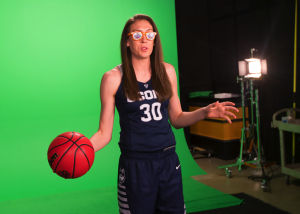 have wrapped up with the production crew, the team rotates to different rooms where they hold discussions with the Westwood One radio crew and film some additional light-hearted, on-camera antics to be used on the in-arena video board.
have wrapped up with the production crew, the team rotates to different rooms where they hold discussions with the Westwood One radio crew and film some additional light-hearted, on-camera antics to be used on the in-arena video board.
With all the hoops that this team is forced to jump through, it can oftentimes become pushed to the side what they are truly here to do – win a national championship. If the team were to lose that vision, even for only one second, they would be brought back to reality very quickly at the start of practice following our time at the NCAA headquarters.
